According to a recent study by HRD America, 55% of employees in the United States do not negotiate their salaries – leaving money on the table and potentially hindering their long-term earning potential.
The fear of being perceived as greedy or damaging their relationship with their employer often holds people back from advocating for themselves and asking for a raise.
However, it’s important to realize that salary negotiation is a crucial part of career development and can significantly impact your financial well-being if not taken seriously.
That’s why in this post, I’ll talk a bit about the art of writing a compelling salary negotiation email and provide tips and tricks to help you confidently ask for what you deserve.
Let’s dive in.
Contents
Why Negotiate Salary?
Before I get to how to write a salary negotiation email, it’s important to understand why negotiating your salary is important in the first place.
Here are some key reasons:

- It can lead to significantly higher lifetime earnings: Negotiating your salary can have a significant impact on your long-term earning potential. In fact, experts like Linda Babcock believe that failing to negotiate a starting salary can result in anywhere between $1 to 1.5 million in lost earnings over the course of a career.
- Most employers expect you to negotiate: More than 70% of employers are willing to negotiate salaries for new hires, but many candidates fail to take advantage of this opportunity. By negotiating your salary, you demonstrate that you value your skills and contributions to the organization, and are invested in your own career development.
- You have a good chance of being successful: When it comes to raises, if you don’t ask, you don’t receive. Luckily, according to CNBC, 85% of Americans who negotiated the offer were successful. So, why not write an email and try your luck as well?
- It can help close the gender pay gap: Unfortunately, the gender pay gap persists in many industries and organizations, however, negotiating your salary can be an important tool in closing the gap.
Salary Negotiation Email Format
A salary negotiation email format isn’t that different from other types of professional business emails. However, you do have to be sensitive with how you approach things when it comes to money.
Here are some general tips to keep in mind when crafting your salary negotiation email:
- Always start with a polite and professional tone: While you are negotiating, it’s important to maintain a professional and polite tone in your email. Begin by expressing your appreciation for the job offer and your interest in the position.
- Highlight your qualifications and value: Use the email to subtly remind the employer of your skills, experience, and achievements that make you a valuable candidate for the role. Use concrete examples and data to illustrate your value to the organization.
- State your desired salary and reasoning: Be specific about the salary you are requesting, and provide clear reasoning for why you believe you deserve that salary. Whether your skills merit a salary worth $30K a year or a salary worth $70,000 annually, consider researching industry standards and salary ranges for your position to support your request (more on that later)
- Be open to negotiation: While it’s important to be clear about your desired salary, it’s also important to be open to negotiation. Consider offering alternatives, such as a sign-on bonus, additional vacation days, or a flexible schedule if the talks aren’t going your way.
Now, with those general tips out of the way, here’s how to write a salary negotiation email while maintaining the right balance and boosting your chance of success.
The Subject Line
The subject line of your salary negotiation email is the first thing the employer will see, and can greatly impact whether or not they choose to open and read your email.
Here are some tips to help you craft an effective subject line:
- Avoid spam-like or generic subject lines: According to a survey by Business2Community, 47 out of 100 HR managers ignore emails with “spammy” subject lines. Make sure your email isn’t one of them.
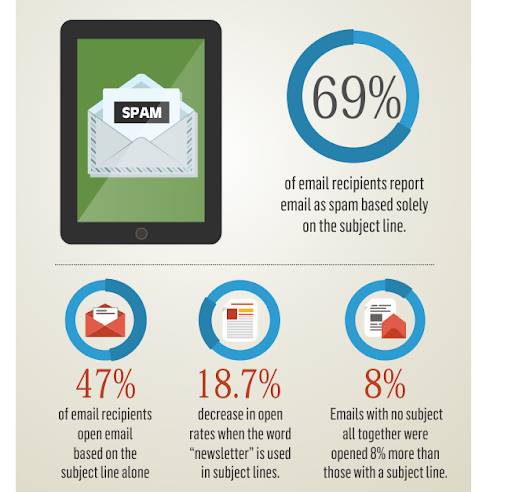
- Include the recipient’s name: Including the recipient’s name in the subject line can boost the chances of a hiring manager opening your email by up to 18.3%.
- Use 6 to 10 words: Subject lines with 6 to 10 words have a 21% open rate, which is the highest, according to a study by SuperOffice.
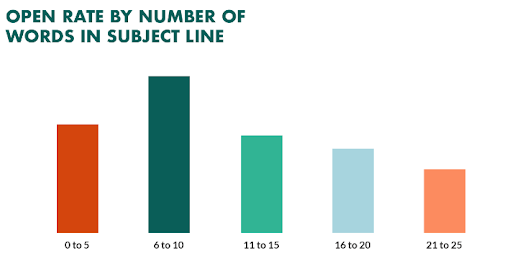
- Avoid ALL CAPS: The experts over at Campaign Monitor report that subject lines written in ALL CAPS are likely to be sent to the spam folder and have fewer opens. So, remember: Keep the Caps Lock key off.
- Capitalize the first word: Inntopia reports that subject lines with the first word capitalized have up to a 16.7% higher open rate than those that don’t.
- Use exclamation points sparingly: Ladders found that emails with exclamation points in the subject line have a 45.5% open rate – compared to the average of 51.9%. So, don’t use them if you don’t have to.
If you’re still uncertain about how to go about it, consider leveraging the power of AI writing tools like ChatGPT to help you craft the perfect subject line.
Although it’s true that you cannot rely on AI tools for facts and information since they’re notorious for getting them wrong, (and I cannot stress this enough).
They are, however, still pretty useful for generating ideas or creating catchy subject lines.
Here’s an example from ChatGPT about some potential subject lines for a salary negotiation email:
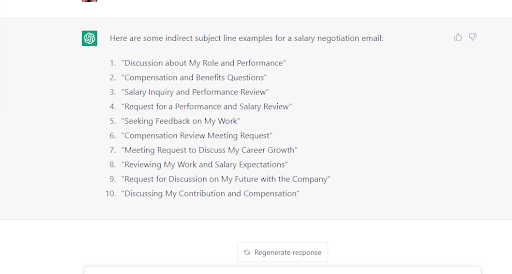
Addressing The Recipient
Given that you’re writing a professional work-related email, the greeting of your email must be formal and respectful.
- Generally, people go for “To whom it may concern” when they aren’t certain about the recipient.
- In other instances, something along the lines of “Dear Hiring Manager” or “Dear Employer” works to address the person when you aren’t sure about their name.
However, knowing the recipient’s name and getting it right is always a better option as it helps grab their attention as soon as they open the email.
Plus, it’s not like finding out your HR manager’s name is impossible or overly difficult either.
A quick search on LinkedIn or Twitter is often all that’s needed to get their names right. You can also consider searching on tools like RocketReach to find contact information for the relevant company’s HR team if you’re not on social media.
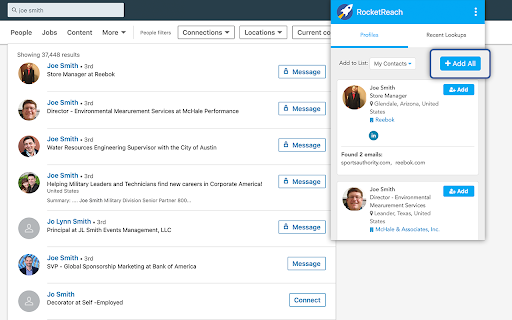
Just remember, your greeting should include the recipient’s title followed by their name. Here are a few examples:
- Dear Mr. Miller
- Dear Ms. Smith
- Dear Dr. Williams
Top Tip: Avoid using a casual greeting like “Hey” when crafting your email. It can leave a negative impression on the recipient, and they may drop your request right away.
Also, be sure to double-check the spelling of the recipient’s name and title before sending your email. Spelling errors can come across as careless and unprofessional.
The Body
This section demands you let your creative juices flow!
It’s usually best to begin with a compliment. After all, you want to express gratitude for receiving the job offer and don’t want to come across as “too demanding/selfish”.

The experts at Harvard Business Review say that it creates a connection with the hiring manager and lets you demonstrate your professionalism. What’s more, it shows your interest in the job and helps you stand out from other applicants.
For instance, you can begin with the following message.
“I appreciate the time and effort the hiring team put into reviewing my application and interviewing me.
I am honored to have been selected for this opportunity and am thrilled to join your team.
However, I would like to talk further about the salary package …”
You should aim to set the stage for negotiating the salary. The key is to encourage a conversation rather than being straightforward in the first go and giving everything away.
Once you receive a response, you can highlight genuine reasons why your request is justified; maybe you have more experience, or perhaps your salary range doesn’t align with your role (more on this below).
The Conclusion Of The Email
A lot of times your boss or hiring manager might want to extend the salary negotiation conversation to learn more about your ground reasons in an in-person meeting or over a phone call.
So go ahead and push for it near the conclusion. Take inspiration from the examples below.
- “I am confident that I can come to a fair and reasonable agreement that works for everyone involved”
- “I’d appreciate it if I could discuss this matter in more detail over a phone call whenever you’re available”
- “I’m sure I can figure out an agreeable salary package over a quick meeting on (date/time). Would that work for you?”
Top Tip: Make sure you sign off with your name and contact details. Missing important details means throwing your initial efforts down the drain.
It portrays unprofessionalism, and it’ll be challenging for the hiring manager to recognize you among the numerous other applicants.
Things to Consider When Negotiating Your Salary
Negotiating salary is important, however, you shouldn’t come across as rude, bold, or unreasonable while doing so.
Otherwise, you may end up creating a negative first impression that’ll affect your professional life down the line.
Keep the following tips in mind to ensure that doesn’t happen and demonstrate yourself as a trustworthy, professional, and impactful worker.
Do Your Research
The best way you can convince your hiring manager that you deserve higher pay is by conducting thorough research, gathering relevant data on salary ranges, and presenting your findings in your email.
And, one of the best ways to extract factual average good salary data is through the US Bureau of Labor Statistics (BLS) website.
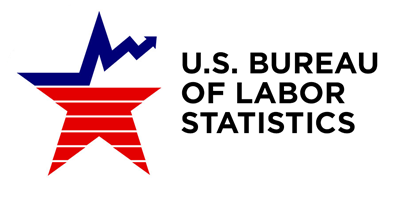
The official BLS site has a treasure trove of information for numerous positions in different industries and locations.
For example, you can filter the research and pick from various occupations to find out more about the base salary for your position in your area.
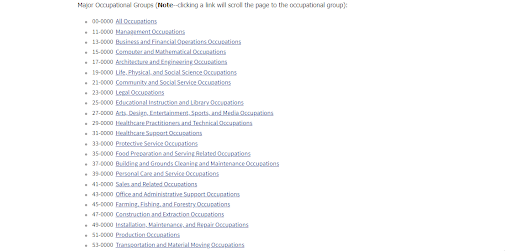
Remember, highlighting the right information will make your salary negotiation email sound more reasonable and justified.
Show Your Worth
The salary negotiation email is your chance to express the value you can add to the company.
- Although 62% of employers are willing to hire candidates with minimal experience, many still prefer applicants with at least some work experience. So, if you have any experience in a relevant field, be sure to highlight it as it will add to your resume and demonstrate your value as an employee.
- Because certifications and skills prove your work ability, hiring managers usually seek out and are willing to be more accommodating to candidates with certifications and specific “high value” skill sets. Therefore, always mention the certifications you hold and the soft and hard skills that go with the role.
Top Tip: Avoid bluffing the company when writing a negotiation email. Neither should you lie about having skills you don’t possess nor should you ask for a raise based on incorrect salary data.
Hiring managers are smart enough to spot deceiving candidates. Consequently, they might reject your offer and may drop you as a candidate for the role altogether.
Consider Other Compensation Forms
It’s no secret that a happy workforce is a productive workforce. And fortunately, most reasonable bosses and recruiters realise that.
So in case your salary negotiation email gets ignored, take another punt and ask for additional perks instead.
For example, consider asking for:
- More annual leaves
- Flexible work hours
- Paid sick leaves
- A gym membership
Ask For More Than What You Desire
Roger Dawson, the author of “Secrets of Power Negotiating,” mentions in his book that one must always “Ask for more than what’s required” if they’re looking for success at the bargaining table.
It will help create a negotiating room and raise your perceived value as an employee.
The recruiter might not offer you what you requested, but more often than not, they’ll consider your request and counteroffer with something that is still higher than their initial offer.
This way, you get what you want, gain some bargaining power in the process, and paint yourself as a person that’s willing to compromise for the good of the company.
What To Do If Your Offer Gets Declined
Although salary negotiations can be successful, there’s always a chance of failure. The key is never to take the rejection personally.
Sometimes, your prospective employer has a ground reason for declining your offer and there’s really not much more that can be done in that situation.

Whatever their reply always remember:
- Be polite when responding to the negotiation email. If you decide to continue the job despite not getting a raise, take some time to calm your emotions before you respond to the email.
- Ask if a retroactive raise is possible if you meet certain work goals within a specific timeframe.
- Simply decline the job offer and continue to look for other opportunities if you feel like it’s not the best option for you. But again, remember to be humble when responding – who knows, you may be back in the same company in the future, so don’t go burning any bridges yet!
Why Is Salary Negotiation Via Email Better?
Some people prefer negotiating a salary in person. However, I feel like an email is a reliable way to handle sensitive topics like this one.
This is because, in an email, you have the space and time to create a comprehensive and structured case highlighting your achievements, experience, and work performance without the added pressure of negotiating face-to-face (introverts can understand!).
- Another advantage of negotiating salary via email is that it allows you to keep a clear record of the negotiation process.
- This can be especially helpful in case there are any misunderstandings or disagreements down the line, as you can refer back to the email thread as evidence of what was discussed and agreed upon.
- Lastly, it might not always be feasible for you to meet your new manager in person due to scheduling or other logistical reasons. In that case, an email can be an excellent option to pave the way for further negotiation.
Key Takeaways:
- Negotiating your salary is an important part of career development that can have a significant impact on your financial well-being.
- Failing to negotiate a starting salary can result in lost earnings of up to $1.5 million over the course of a career.
- More than 70% of employers are willing to negotiate salaries for new hires.
- Negotiating your salary demonstrates that you value your skills and contributions to the organization and are invested in your own career development.
- According to CNBC, 85% of Americans who negotiated their offer were successful.
- When crafting your salary negotiation email, it’s important to maintain a professional and polite tone.
- Use concrete examples and data to illustrate your value to the organization.
- Be specific about the salary you are requesting and provide clear reasoning for why you believe you deserve that salary.
- Consider researching industry standards and salary ranges for your position to support your request.
- Be open to negotiation and consider offering alternatives if the talks aren’t going your way.
- Craft an effective subject line that includes the recipient’s name, has 6-10 words, avoids spammy or generic language, and uses capitalization and exclamation points sparingly.
- When addressing the recipient, use a formal and respectful greeting.
- Use the body of your email to highlight your qualifications and value, state your desired salary and reasoning, and be open to negotiation.
In conclusion – negotiating your salary is an essential part of career development that can have a significant impact on your financial well-being.
By following the tips and tricks outlined in this post, you can write a compelling salary negotiation email that helps you confidently ask for what you deserve.
Remember to maintain a professional and polite tone, highlight your qualifications and value, and be open to negotiation.
With a little bit of effort – and the right approach – you can successfully negotiate your salary and take your career (and bank balance!) to the next level.
Next: consider reading my guide on How to Double $10k Quickly and best of luck on your email salary negotiations.

